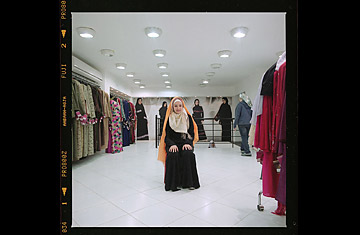
At a store in Cairo, an assistant places a white scarf of nontransparent material directly on the head of another assistant, ensuring that all of the hair is concealed.
(3 of 4)
The flap underscores an emerging political trend. Since 9/11, polls have consistently shown that most Muslims do not want either an Iranian-style theocracy or a Western-style democracy. They want a blend, with clerics playing an advisory role in societies, not ruling them. As a consequence, Islamist parties are now under intense scrutiny. "Islamists, far from winning sweeping victories, are struggling to maintain even the modest gains they made earlier," says a recent survey by the Carnegie Endowment for International Peace. In Iraq's recent elections, for example, secular parties solidly trumped the religious parties that had fared well four years ago.
Rethinking Tradition
Politics is not the only focus of the soft revolution. Its most fundamental impact, indeed, may be on the faith itself. In the shadows of Kocatepe Mosque in Ankara, Turkey, a team of 80 Turkish scholars has been meeting for the past three years to ponder Muslim traditions dating back 14 centuries. Known as the hadith, the traditions are based on the actions and sayings of the Prophet Muhammad and dictate behavior on everything from the conduct of war to personal hygiene. (See pictures of Iranians.)
Later this year, the Turkish scholars are expected to publish six volumes that reject thousands of Islam's most controversial practices, from stoning adulterers to honor killings. Some hadith, the scholars contend, are unsubstantiated; others were just invented to manipulate society. "There is one tradition which says ladies are religiously and rationally not complete and of lesser mind," says Ismail Hakki Unal of Ankara University's divinity school, a member of the commission. "We think this does not conform with the soul of the Koran. And when we look at the Prophet's behavior toward ladies, we don't think those insulting messages belong to him." Another hadith insists that women be obedient to their husbands if they are to enter paradise. "Again, this is incompatible with the Prophet," Unal says. "We think these are sentences put forth by men who were trying to impose their power over the ladies."
The Hadith Project is only one of many such investigations into Islam's role in the 21st century. This is perhaps the most intellectually active period for the faith since the height of Islamic scholarship in the Middle Ages. "There is more self-confidence in the Islamic world about dealing with reason, constitutionalism, science and other big issues that define modern society," says Ibrahim Kalin of the Foundation for Political, Economic and Social Research in Ankara. "The West is no longer the only worldview to look up to. There are other ways of sharing the world and negotiating your place in it."
Crucially, this latest wave of Islamic thought is not led only by men. Eman el-Marsafy is challenging one of the strictest male domains in the Muslim world--the mosque. For 14 centuries, women have largely been relegated to small side rooms for prayer and excluded from leadership. But el-Marsafy is one of hundreds of professional women who are memorizing the Koran and is even teaching at Cairo's al-Sadiq Mosque. "We're taking Islam to the new world," el-Marsafy says. "We can do everything everyone else does. We want to move forward too."
The young are in the vanguard. A graduate in business administration and a former banker, el-Marsafy donned the hijab when she was 26, despite fierce objections from her parents. (Her father was an Egyptian diplomat, her mother a society figure.) But last year, el-Marsafy's mother, now in her 60s, began wearing the veil too. That is a common story. Forty years ago, Islamic dress was rare in Egypt. Today, more than 80% of women are estimated to wear the hijab, and many put it on only after their daughters did.
Piety alone is not the explanation for the change in dress. "The veil is the mask of Egyptian woman in a power struggle against the dictatorship of men," says Nabil Abdel Fattah of Cairo's al-Ahram Center for Political and Strategic Studies and author of The Politics of Religion. "The veil gives women more power in a man's world." Ziada, the human-rights activist, says the hijab--her headscarves are in pinks, pastels, floral prints and plaids, not drab black--provides protective cover and legitimacy for her campaigns.
